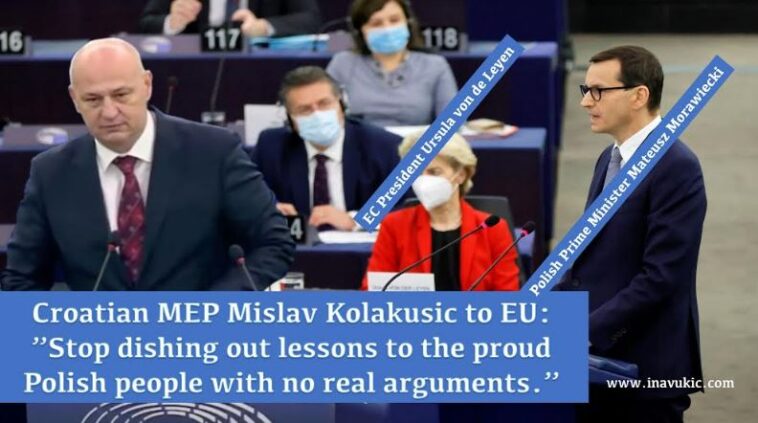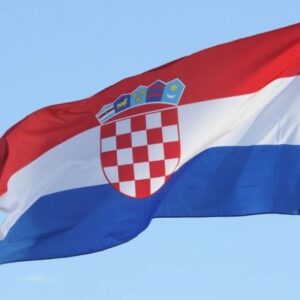Earlier this month of October 2021 Poland’s constitutional court ruled that parts of EU law are not compatible with the Polish constitution, which Poland evidently and, as far as many are concerned, rightfully places above the EU constitutional charters. This has developed in a dramatic escalation of a battle between Warsaw and Brussels. The EU disagrees with the Polish court rule and this disagreement has sparked questions about Poland’s long-term future in the EU, with the government’s critics at home and abroad accusing it of setting the country on course for “Polexit” while the government at the same time enjoys enormous support and agreement with the constitutional court rule at home and internationally.
The battle and disagreements between the EU and Poland overshadowed the EU summit of the 27 member states in Brussels this week. The summit opening day media spotlights flickered between Poland’s prime minister Mateusz Morawiecki, president of the European Commission Von der Leyen, Germany’s exiting Chancellor Angela Merkel, prime minister of Hungary Victor Orban and several others, giving a clear picture that not all is well with the union and harmony regarding embracing the “Union” that would homogenise member nations into a concoction similar to former federation of communist Yugoslavia as opposed to retaining national identity and sovereignty of each member state. The political pull for the EU to be a federation of sovereign states has certainly gained momentum this week largely due to the ruling of the Polish constitutional court, placing Poland above the EU in certain matters of law.
Whether money will talk is a matter of Poland’s response to Brussels’ moves that look terribly like blackmail: EU officials have said that the Polish court ruling constitutes breaches of EU values and has now commenced withholding approval of Warsaw’s application for €36bn in Covid-19 recovery funds. The European Commission is also under increasing pressure to deploy powers that would allow it to hold back Poland’s regional development funds worth up to €121bn over the next six years.
European Union officials have late this week left us with a clear impression that the EU is facing an unprecedented situation in which a member (Poland) is directly challenging a founding principle of the bloc (EU): the primacy of EU law over national legislation. Some analysts also argue that Poland’s refusal to change its views may pose a bigger threat than Brexit.
EU President Ursula Von der Leyen described the Polish tribunal’s ruling as “a direct challenge to the unity of the European legal order”.
“E.U. legitimacy is at stake: if there’s no primacy of European law over national laws, what’s the point of having a union?” said Sophie Pornschlegel, a senior policy analyst at the Brussels-based European Policy Centre.
Didier Reynders, the EU’s justice commissioner, said after the ruling that Brussels would act to protect the primacy of EU law over national law and the binding nature of the European Court of Justice’s rulings on national governments.
“We are very firm on the different principles, and we will use all the tools at our disposal to be sure that it is possible to protect them,” Reynders added.
As far as Croatia’s input or opinions with view to this escalating battle for supremacy of EU laws one does not expect to hear much from the official government at this stage. That is evidently because the ruling HDZ (Croatian Democratic Union) is a member of the European People’s Party/EPP bloc that is said to have pioneered the EU project and whose current president is none other than Poland’s former prime minister Donald Tusk, also ex-president of European Council, whose political party now represents one of the strongest oppositions to the ruling PiS party in Poland. We have seen protests in Poland recently and we are sure to see more as Tusk calls those who will listen to rise and help save Poland (against Morawiecki of course). In his day of power Tusk fumbled through European Council’s corridors like a man who has grown too big for his boots, and he continues stirring fear among the Polish people. Thankfully those that listen to him are fewer and fewer by the day. In people’s mind, surely, there is nothing wrong with fighting to retain one’s sovereignty. Tusk is a “Yes” man for EU, while Morawiecki is evidently not. With this battle to retain superiority over EU laws having arisen in Poland so strongly next general elections due late 2023 will show for certain where most Poles stand on this if matters don’t progress to a resolutuion.
It was very interesting and confidence-boosting to see that Croatian members of the European Parliament did have a say on the topic of Poland and its insistence on the supremacy of its national laws over the EU. The independent Member of the European Parliament Mislav Kolakusic called out, loud and clear, European Commission President Ursula von der Leyen and her administration at a European Parliament session this week on October 19 for constant baseless attacks on sovereign EU member states: ” Poland has always been in the heart of Croatian citizens and we have always shared the same sense of law and justice. The fact is that those who govern the European Union today want to impose their ideologies on all sovereign states behind that illegitimate goal. The only goal of this Kafkaesque process is to overthrow the legally elected sovereign government and bring in a puppet government. Do not forget that the Polish people fought against every oppression, both against Nazism and against communism, and they will certainly not bow their heads now against these new forms of committing (oppression). The European Union must become an equal community of sovereign states, or its future is more than questionable. Stop dishing out lessons to the proud Polish people with no real arguments. Thank you,” said Kolakusic and his speech can be followed in this video record from EU Parliament:
EU’s insistence that its laws have supremacy over national laws of its member states has existed always but this time the issue is catapulted into the public arena with escalated vigour, leaving multitudes in various EU member states perhaps more than ever inclined to consider who and what they are, where are they going as a distinct nation – into strength or oblivion. Certainly, this whole issues brings back bitter memories for nations made subservient to communist regimes of former Yugoslavia and USSR where individual nations and states had to conform to a federal ideology and practice that did not recognise or uphold their individual values and worth. During the time for former Yugoslavia the regime came up with a nationality called Yugoslav that people were expected to embrace and abandon Croatian, Serb, Montenegrin, Slovene, Macedonian…nationality. It was individual national pride and protection that eventually made Yugoslavia a failed experiment in unity. Similar in USSR/Soviet Union where all members of the union had to comply with what Moscow says and does and collapse was imminent as was for communism that bases its ideology on equality of people but riddled with rotten human ego that builds terrible inequality instead of equality.
The fatal flaw of EU’s idealism within a “Parliament of Nations” that would work towards lasting peace within and among nations was and is its false assumption that national identities and nationalism are toxic, in need of institutional guard rails to check their dangerous rivalries. Perhaps and as planned by some by giving up some national sovereignty to the bureaus and agencies of the E.U., a more efficient and just political order could be achieved. But it hasn’t worked out that way. First, even though the EU boasts that it has values to which all member states should adhere, it has not been clear what the core beliefs are that could unite such diverse and various cultures, histories, folklore, national interests, and customs tightly enough to ensure efficient functioning and cohesive loyalty. Europe was created in the first place by the Greco-Roman and Christian civilization. With religion fading in much of Europe, and patriotism being looked down upon, the love for one’s own people, language, and culture demonised as incipient fascism, what’s left to unite the peoples under the E.U. banner into a cohesive people who are willing to fight together and die for their European identity? Nothing much! When the member states filled with people that are patriotic to their individual nations experience being labelled as nationalistic fascists because they are a patriot you have a big problem! People will rise in one way or another, sooner or later, to defend their personal honour of belonging to a particular nation.
Hence, in many ways the issues developing along the question of EU supremacy over individual member state’s ability to bring decisions and make laws that suit its own local (national) needs without regard to compliance to EU laws will more likely than not provide a fertile ground for decisions and contemplation about EU membership in several countries. As Croatian government intends introducing the EU Zone common currency – euro – soon, the enormous adjustment costs in this process will highlight the bad side of the EU concept and create greater poverty than what there is now. In former communist Yugoslavia the “big pot” of money into which each member state of the federation contributed reminds one of the EU “big pot” of money and the flaws and resentments that arose in relation to the “big pot” operational undercurrents in former Yugoslavia are surfacing in the EU. The EU is starting to blackmail or threaten its members states with cut or withdrawal or redistribution of funds if a member state misbehaves or does not comply. The member countries that contribute more to that “big pot” than other member countries are already behaving as having a political or decision power advantage over others. Such union that creates politically elitist echelons is already on life supports – unless of course the sovereignty of each member states is respected and upheld particularly in dealing with local welfare, laws and economic development. Ina Vukic




